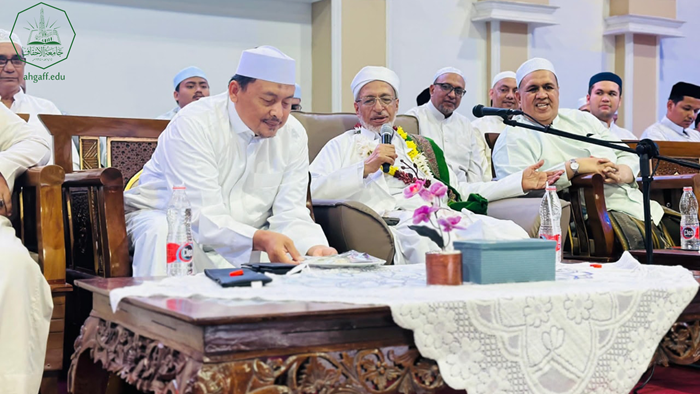Professor Abdullah Baharoon Participates in Academic Symposium on Indonesian Society and Artificial Intelligence
- 4/8/2025
- University News

Jakarta – University Media
As part of his official visit to the Republic of Indonesia, Professor Abdullah Mohammed Baharoon, President of Al-Ahgaff University, delivered a scholarly lecture titled "Indonesian Society and Artificial Intelligence."
The symposium was held at the Sharia Institute in Patamburan, Jakarta, where Professor Baharoon was warmly received by Dr. Habib Muhammad Rizq Hussein Shihab, Professor Bui Yahya Zain Ma’arif Jamzuri, along with a distinguished gathering of scholars, religious figures, and students of knowledge.
In his address, Professor Baharoon discussed how Indonesia, as the most populous Muslim-majority country, presents a fertile ground for embracing emerging technologies, particularly artificial intelligence (AI). He highlighted the nation’s rapid digital transformation in key sectors such as education, healthcare, and public services.
Professor Baharoon emphasized the importance of integrating AI into academic curricula at both the school and university levels, noting that artificial intelligence has become a vital component of modern life and, in many cases, an essential necessity. He also warned of the challenges posed by the irresponsible use of AI and called for the promotion of ethical and religious awareness when engaging with such technologies.
He concluded his lecture with an optimistic vision for the future of AI in Indonesia, urging increased investment in scientific and technological research to build a knowledgeable and forward-looking society.
As part of his visit, Professor Baharoon also visited the Dar Al-Mughni Al-Malikiah Institute, where he delivered a lecture on education. In his talk, he described education as a holistic process aimed at nurturing individuals spiritually, intellectually, and morally. He stressed that education in Islam extends beyond academic learning to include the purification of the soul and the instillation of virtuous values. He pointed out that no society can progress without sound education that produces conscious, responsible generations committed to serving their nations. He further explained that the educational process begins at home, is reinforced by schools, and is supported by the wider community.
Professor Baharoon also addressed some of the key challenges facing education in the modern era, including cultural invasion, weakened identity, unregulated technological influence, and blind imitation of Western societies at the expense of Islamic values. He called for the protection of students through Islamic principles, emphasizing that the responsibility lies with all segments of society to safeguard the youth and confront these dangers through comprehensive and proactive approaches.



